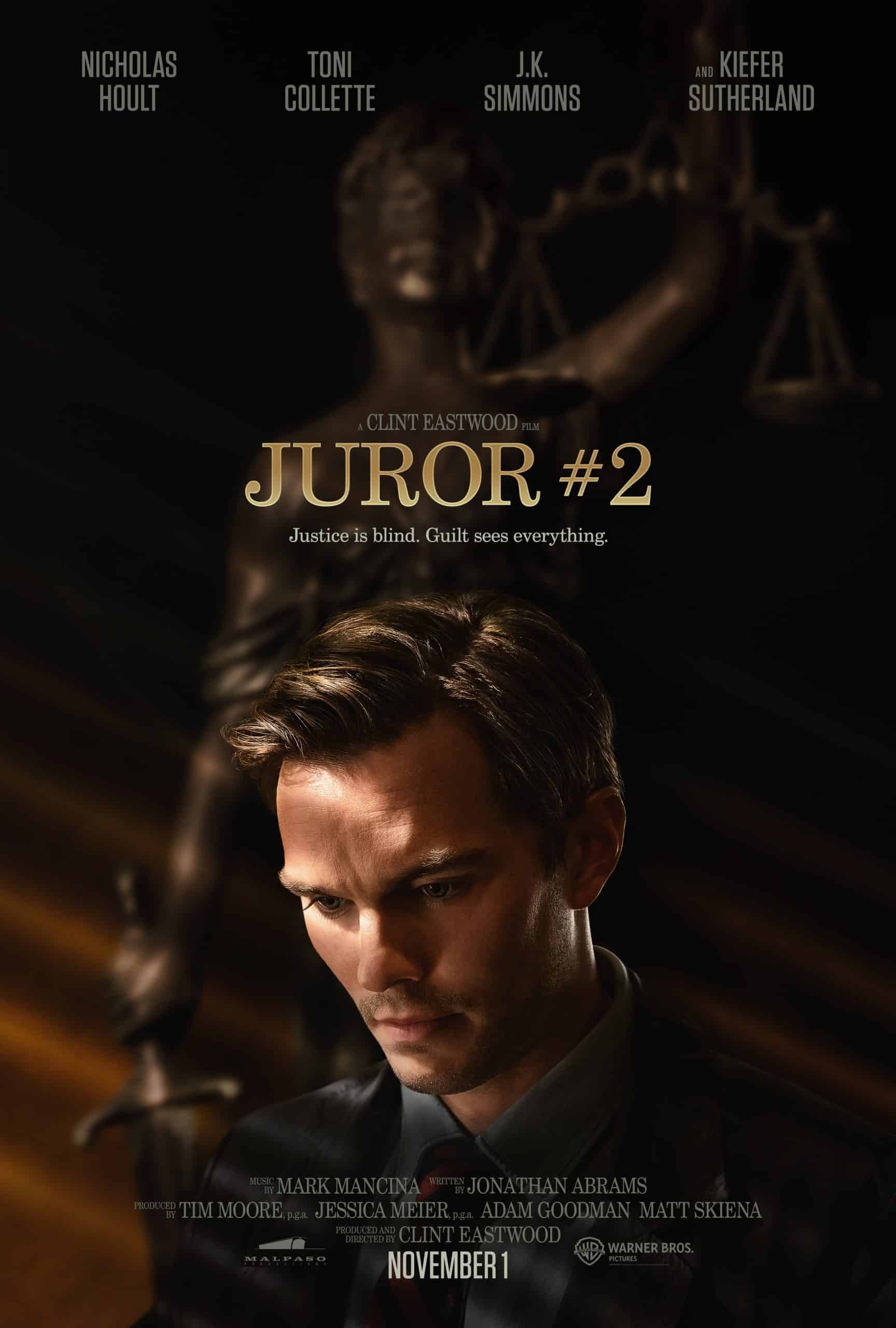
- Starring
- Nicholas Hoult, Toni Collette, J.K. Simmons
- Writer
- Jonathan A. Abrams
- Director
- Clint Eastwood
- Rating
- 14A (Canada), PG-13 (United States)
- Running Time
- 114 minutes
- Release Date
- November 1st, 2024 (limited)
Overall Score
Rating Summary
In a year defined by late career efforts by legends such as Francis Ford Coppola’s Megalopolis and Paul Schrader’s Oh, Canada; the latest from Clint Eastwood follows suit, albeit an effort lacking many of the defining quirks of his previous films or the flair of those aforementioned films. Instead, Juror No. 2 is a film modelled in the neo-classical style. Not showy in the slightest, the film is rather a showcase of its clever script and remarkable performances. At 94 years of age, Eastwood may have just released the most defining film of his late career. A stage defined by self-examining works such as Cry Macho, the film sees the director take aim yet again towards powerful American institutions and concepts of guilt, loss, and justice as it pertains to the everyman. Meanwhile, it features some of the best filmmaking audiences will see all year, work which spawns incredible performances and fascinatingly textured scenes. Eastwood’s latest is not just one of the best films of the year, it is one of the best made films in recent memory. While his direction is remarkably assured, the film’s thematic, albeit unsubtle, undertones are incredibly well executed.
Juror No. 2 is centred around Justin Kemp (Hoult), a writer begrudgingly picked for jury duty despite being needed at home to help take care of his pregnant wife Allison (Zoey Deutch). Their lives soon found themselves upended when during the trial, he begins to notice similarities between the case an incident from his recent past. The film sees him fight against his own guilty conscience and the sense of justice which he has been taught to believe in. In God We Trust looms ominously over those in the courtroom as Kemp reckons with his own actions and what needed to be done. Can he be sure enough of his actions to put a potentially innocent man away? And at what cost? The outstanding lighting drives home the film’s visual motifs in a way that will surely strike a chord with audiences through the constant referencing of Lady Justice’s blindfold by how it obscures scenes to varying degrees.
Additionally, the cinematography is in perfect lockstep with Eastwood’s direction as it represents the world stripped from the stylistic flairs akin to the other late career efforts this year. The film’s presentation seeks to pull audiences into the moral quandary it presents in a grounded way. On the performance side, they are stunning across the board, led by Hoult as Kemp. His portrayal of a man on the verge of a moral collapse is among the best this year so far. It is a powerful and riveting performance, accented through the focus on his eyes. Hoult can tell a story through his eyes alone and he does exactly that here, what a performance. Eastwood’s film, although timeless, is set and filmed in a contemporary America, shooting in ordinary courtrooms, houses, parks, etc. Not relying on big lavish sets, neon lighting or big boisterous set pieces, the film focuses on its characters and their complicated struggles. Taking aim at the American justice system, not to establish them as an evil authoritarian force, he seeks to question the system by putting it under a microscope.
There is a point in the film where defence attorney Eric Resnick (Chris Messina) toasts to his opponent Faith Killebrew (Collette) stating “To the justice system, it’s not perfect, but it’s the best we got.” This line is, more or less, the antithesis of the film’s primary thesis as navigated through Kemp’s story, told brilliantly through Eastwood’s direction and a script which is as fun and engaging as it is ponderous.
In the end, at the ripe old age of 94-years-old, Clint Eastwood’s Juror No. 2 is one of this decade’s most definitive American texts, right at a time when the country needs it. It is important to question these institutions of power, and no one is doing it quite like Eastwood.
still courtesy of Warner Bros. Pictures
If you liked this, please read our other reviews here and don’t forget to follow us on Twitter or Instagram or like us on Facebook.
Discover more from
Subscribe to get the latest posts sent to your email.

